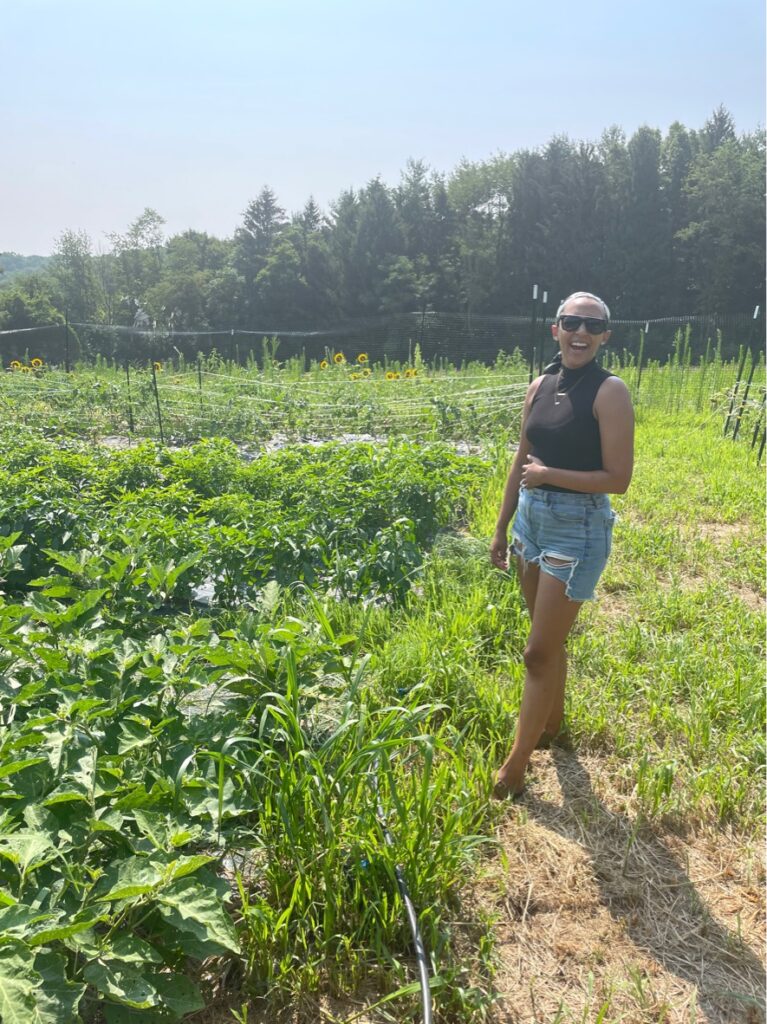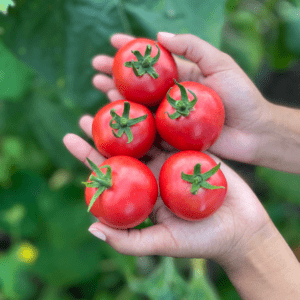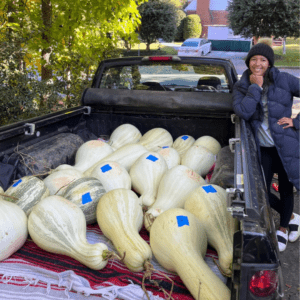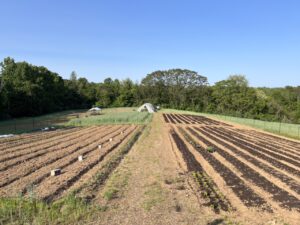Beauty Blooms is one of the Capital Area Food Bank’s newest local farm partners. Starting this spring, the food bank began buying produce from Beauty Blooms, thanks to funding from the Local Farm Purchasing Assistance Cooperative Agreement (LFPA), a grant program that allows us to support Maryland farms as we supply healthy produce for our neighbors.
How does a nonprofit worker end up starting her own farm, working 12-hour days, and loving it?

Nia Nyamweya, the founder and farm manager of Beauty Blooms, spent her career working on social-justice issues, ranging from prison reform to advocating for the health and wellness of Black workers. After various community-organizing positions across the country, she landed in philanthropy, where she began to feel the creeping exhaustion of burnout.
So Nia decided to attend a workshop from a mini farm in DC – and she fell in love. She decided to step in a little further, participating in a beginning farmer training program. Armed with her new skills and knowledge, Nia took the plunge three years ago to start her own farm in Montgomery County, Md. And it’s been abundantly rewarding.
The crops growing on her farm are now heading to neighbors in need across the region, through her partnerships with the Capital Area Food Bank and with Manna Food Center (which is also a food-bank partner). She sends tomatoes, snap peas, swiss chard, and more directly to the Mid-County Hub at Harvest Intercontinental Church, another of the food bank’s partners in Olney, Md., where that fresh produce gets distributed to clients.
By the end of 2023, the food bank purchased 8,500 pounds of food from Beauty Blooms – or roughly 7,083 meals-worth of locally-grown ingredients.

Her partnership with CAFB has allowed Beauty Blooms to find consistent demand — which can be quite a challenge for a small farm. Farmers markets are among the best places to find customers, but buyers there can be inconsistent from week to week when it comes to how much and what they are buying. Because of this, her partnership with the food bank has been a “game changer,” Nia says. By working with the food bank, Beauty Blooms has a “steady” and “reliable” buyer, so she can focus on growing high-quality, nutrient-packed produce.
Through launching her farm, Nia has also found a deeper connection to her Kenyan heritage. She primarily grows African-heritage crops – produce like white garden egg eggplant, plate de Haiti tomatoes, and green cushaw squash. She recently had a lovely harvest of the green cushaw squash – giant gourds the size of a baby.

When she started, she invited a group of Kenyan elders to sing and perform a land blessing over the farm. She’s been able to connect with other African women farmers in Montgomery County.
“I love the self-determination of farming and I love being outside,” Nia says. Farming has deepened her relationship with the land, and her relationship with food. “My own mental, spiritual, physical health and [the health of] others who come to the farm…really improves astronomically when you’re out on the land.”
Still, starting a farm has been hard work. She’s encountered a variety of obstacles, from battling groundhogs to struggles with accessing enough water for her crops. Her farm doesn’t have access to a consistent water supply, so she has to rely on the rain. When there’s not much rain, she has to drive to the nearest river, pump water with a gas pump, and haul it back to the farm.

“I really want to quit – like really want to quit, sometimes,” she tells us. But her community, especially her family, keeps her going. She talks about trellising tomatoes with her father, who helps on the farm. He tells her “You know how proud I am of you. Just keep going.”
And so she does.
You can learn more about Beauty Blooms and purchase their produce here.

